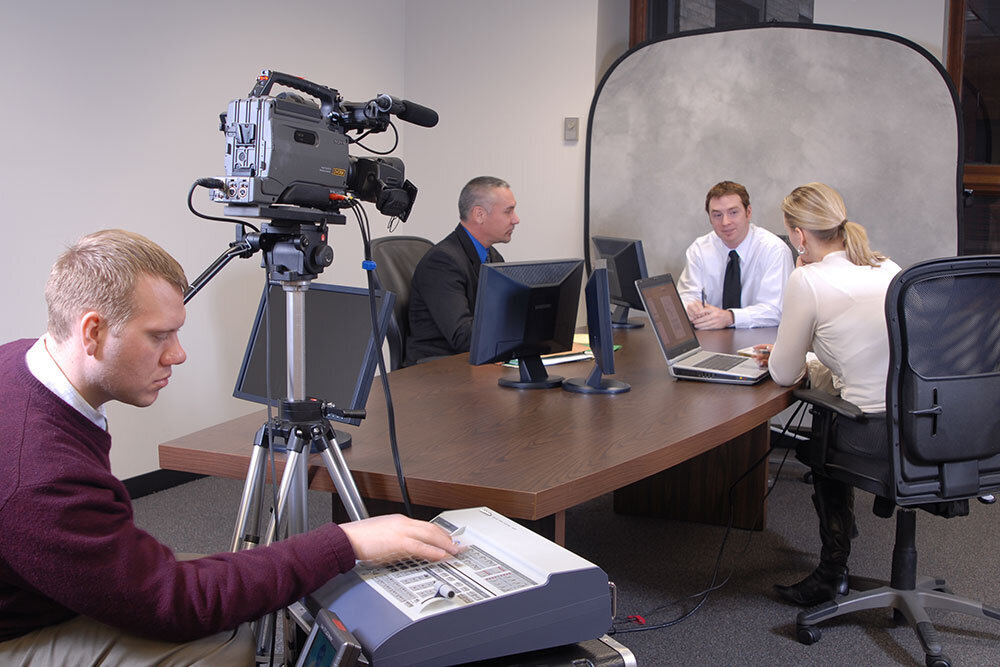The Relevance of Lawful Video Clip Depositions in Modern Legal Solutions: What You Need to Know
Lawful video clip depositions have become important in today's legal landscape. They provide a multidimensional sight of witness statements that conventional transcripts merely can not match. By recording both spoken and non-verbal interaction, these depositions boost the general understanding of a witness's integrity. The effectiveness of video clip depositions hinges on numerous aspects, including conformity with legal criteria and finest techniques. Checking out these elements discloses their true value in contemporary lawful services
What Are Legal Video Depositions?
Lawful video clip depositions function as an important tool in the litigation process. They include videotaping witness testimonies in a video format, catching both non-verbal and verbal interaction. This technique permits lawyers to record the demeanor, expressions, and reactions of witnesses, offering a richer context for the statement. Usually carried out in a regulated setting, these depositions are led by lawyers who ask concerns while a court press reporter records the dialogue. The resulting video can be essential for trial preparation, as it enables lawyers to assess the reliability of witnesses and refine their strategies. Additionally, lawful video clip depositions can be used in different legal contexts, ranging from civil disagreements to criminal instances. The aesthetic and auditory elements of video depositions boost the presentation of proof, making it a crucial component in the modern-day lawful landscape. In general, they contribute substantially to the performance and effectiveness of lawful procedures.

Advantages of Video Depositions Over Typical Approaches
Video depositions supply various benefits contrasted to conventional approaches of taking witness testimonies. One considerable advantage is the ability to catch both visual and audio elements, supplying an extra extensive document of the witness's statements. This double layout boosts clarity and enables lawful specialists to reference specific nuances throughout test preparation. Furthermore, video depositions assist in remote engagement, making it easier for witnesses who may be unavailable for in-person appearances because of geographical restrictions or health and wellness issues.Moreover, video clip depositions can accelerate the overall deposition process, decreasing the time and expenses connected with travel and logistics. They likewise improve availability, as videotaped depositions can be easily shared amongst lawful groups and referenced at any moment. This ease adds to much better situation monitoring and prep work. Generally, video clip depositions represent a modern, efficient approach to collecting witness testaments, lining up with the progressing requirements of the legal career.
The Duty of Body Language and Tone in Testimonies

In legal video depositions, body language and tone play crucial roles in sharing a witness's integrity and credibility. Nonverbal cues can supply insights right into a witness's mood, affecting exactly how their testament is viewed. Recognizing the effect of these components is vital for jurors and lawyers alike when evaluating the dependability of a testimony.
Nonverbal Communication Insights
While spoken communication is commonly emphasized in lawful statements, nonverbal signs such as body language and tone play a necessary duty in conveying reputation and emotion. Onlookers of depositions may keep in mind that a witness's posture, gestures, and face expressions can greatly influence understandings of integrity. Consistent eye contact may indicate self-confidence, while staying clear of stare can suggest deceit or discomfort. Similarly, the tone of voice-- its pitch, volume, and speed-- can pass on feelings of sincerity or unpredictability. Attorneys should be attuned to these nonverbal signals, as they typically offer vital context that matches spoken words. Recognizing these nuances can improve the effectiveness of depositions and influence the outcome of lawful process.
Emotional Tone Impact
The psychological tone conveyed throughout legal testimonies considerably influences just how a witness is viewed. Body movement, vocal inflections, and faces play important duties fit the story of a statement. A witness showing confidence through constant eye call and a calm tone can instill a feeling of reliability and involvement. On the other hand, indications of anxiety, such as fidgeting or an unstable voice, may bring about uncertainty regarding their account. The nuances of emotional expression can affect the interpretation of realities, making it vital for lawyers to recognize these hints. In video clip depositions, the visual and acoustic components integrate, stressing the importance of psychological tone in conveying genuineness and reliability within the lawful process.
Reputation and Credibility
An essential element in developing credibility and dependability throughout testimonies lies in the witness's body movement and intonation. Observers typically rely upon non-verbal cues-- such as eye get in touch with, pose, and motions-- to assess a witness's sincerity. As an example, a witness that keeps eye contact and displays open body language may be useful link viewed as even more trustworthy and straightforward than one that avoids eye contact or appears shut off. Additionally, intonation plays an essential function; a consistent, calm tone can strengthen the reliability of the statement, while fluctuations in pitch or quantity may increase questions. Eventually, the combination of body movement and vocal tone greatly affects how a witness's statements are gotten and translated in a legal context.
Finest Practices for Conducting Video Clip Depositions
Performing video depositions calls for mindful planning and execution to guarantee a clear and efficient presentation of testament. It is crucial to choose a peaceful, well-lit location to decrease disturbances and safe optimum video top quality. The equipment needs to be tested beforehand, consisting of video cameras, microphones, and lighting, to avoid technical problems throughout the deposition.Next, events entailed should examine the format and treatments in advance, ensuring that every person comprehends their roles. The deponent should be informed on the procedure, including exactly how to respond clearly and concisely.Additionally, preserving a specialist temperament throughout the session is vital. This consists of avoiding from speaking over each other and validating that all inquiries are guided suitably. It is critical to tape-record the deposition in a format that allows for easy playback and review, protecting the stability of the testimony for future usage.
Legal Considerations and Compliance Issues
Exactly how do lawful considerations and compliance issues impact the effectiveness of video depositions? Lawyers need to browse an intricate landscape of regulations, making sure that video clip depositions stick to administrative rules and requirements. Conformity with legislations concerning privacy, authorization, and taping techniques is important. As an example, obtaining explicit approval from all celebrations included is essential to avoid legal repercussions.Additionally, the admissibility of video clip proof in court can hinge on compliance with procedural demands. Guaranteeing that the tools utilized fulfills technological criteria is likewise crucial, as low quality can threaten the deposition's reliability.Moreover, lawyers should know any type of particular state legislations that govern video clip depositions, as these can differ considerably. Failure to deal with these factors to consider can not only endanger the integrity of the deposition however additionally influence the general instance method, eventually impacting the client's lawful outcomes.
How Video Depositions Effect Court Perception
While video clip depositions can act as powerful tools in legal proceedings, their influence on court understanding is substantial. The aesthetic and acoustic elements of video recordings provide jurors with a much more thorough understanding of witness disposition, credibility, and emotional actions. This multimedia approach can boost the jurors' capacity to analyze the dependability of testimony contrasted to conventional text-based transcripts.Moreover, video clip depositions allow jurors to observe body movement, tone of voice, and faces, all of which can impact their interpretation of the witness's statements. The visibility of a see witness on display can humanize them, promoting empathy and connection, which may guide jurors' opinions. Alternatively, a witness who shows up evasive or unreliable on video clip might lead to negative understandings that influence a jury's decision. Ultimately, the dynamic nature of video clip depositions plays a crucial function fit how jurors analyze evidence and reach their verdicts.
The Future of Video Clip Depositions in Legal Technique
As improvements in innovation remain to reshape the lawful landscape, the future of video clip depositions is poised for substantial development. Innovations such as man-made intelligence, virtual reality, and boosted video clip conferencing devices are anticipated to enhance the deposition procedure and boost accessibility. Lawyers might make use of AI-driven analytics to analyze witness credibility and instance toughness a lot more effectively.Moreover, the assimilation of virtual reality could enable courts to experience immersive simulations of depositions, offering much deeper context and understanding. Additionally, the pattern towards remote depositions is likely to persist, offering better flexibility for clients and lawyers alike.As remote work comes to be progressively normalized, video clip depositions will likely become conventional technique, minimizing costs and time restraints linked with conventional methods. Overall, these technical improvements guarantee to improve the efficiency, effectiveness, and availability of video clip depositions in legal method, eventually changing how legal professionals prepare for test.
Frequently Asked Concerns
Just How Much Do Legal Video Depositions Typically Cost?

Can Video Depositions Be Used in Any Sort Of Instance?
Video depositions can be made use of in various sorts of instances, including civil, criminal, and family legislation. Their versatility enables lawyers to existing witness testimonies efficiently, adjusting to the specific needs of different lawful scenarios.
What Devices Is Required for a Video Clip Deposition?
To carry out a video clip deposition, vital tools includes a premium electronic camera, microphone, lighting, and a reputable recording device. In addition, a computer system with modifying software might be necessary for post-production and formatting the last video clip.
For how long Does a Typical Video Deposition Last?
A common video deposition lasts in between 2 to 4 hours, relying on the complexity of the case and the variety of questions presented. Extensive sessions might happen, but breaks are normally integrated for individual convenience.

Are Video Depositions Admissible in Court?
Video depositions are typically acceptable in court, offered they abide by lawful standards and policies of evidence. Their use enhances clarity and preserves witness testimony, helping in the judicial process during hearings and trials. Legal video clip depositions have actually ended up being essential in today's lawful landscape. Additionally, legal video clip depositions can be utilized in different legal contexts, varying from civil conflicts to criminal cases. In addition, video depositions facilitate remote engagement, making it much easier for witnesses that might be inaccessible for in-person looks due to geographical restraints or health and wellness issues.Moreover, video clip depositions can quicken the general deposition process, reducing the time and expenses associated with traveling and logistics. Guaranteeing that the equipment utilized fulfills technological standards is also crucial, as bad high quality can weaken the deposition's reliability.Moreover, lawyers must be conscious of any kind of particular state legislations that control video clip depositions, as these can vary considerably. In addition, the trend towards remote depositions is most likely to linger, supplying Click This Link better versatility for clients and lawyers alike.As remote work becomes increasingly stabilized, video clip depositions will likely end up being standard method, decreasing expenses and time restrictions linked with traditional approaches.
Comments on “Legal video depositions vs written transcripts: Which is more effective for trial?”